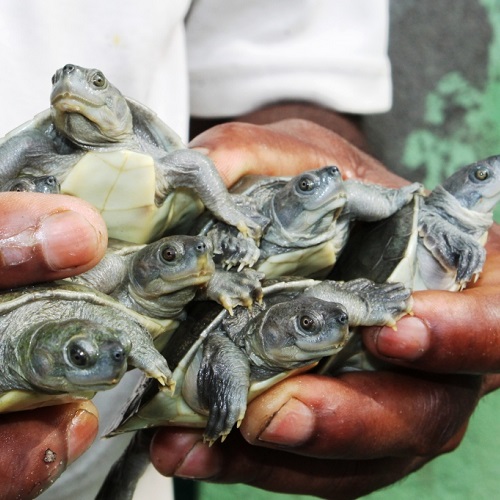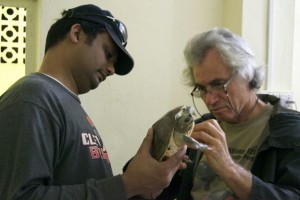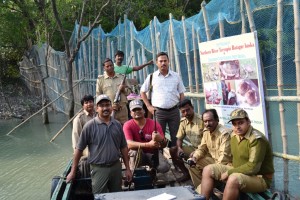Northern river terrapins in India

Status
Critically endangered
Population
Less than 50
Scientific name
Batagur baska
The northern river terrapin is the world’s second most endangered turtle with less than 50 adults known at four captive locations and possibly a few surviving wild specimens.
The problem
The Sundarbans eco-region is a coastal area featuring river channels and drainage systems that make up the Ganges Delta across India and Bangladesh. Large areas of the Sundarbans are protected by the Sundarbans Biosphere Reserve, the Sundarbans Tiger Reserve, several parks and as a World Heritage Site.
Unfortunately, a long history of exploitation and lack of enforcement in both countries has resulted in unsustainable use. Several species which were endemic to the Sundarbans have become extinct or are now close to extinction. One such species is the northern river terrapin. It used to be found in the large rivers and estuaries of the coastal district of the Sundarbans. For more than a decade in Bangladesh, and even longer in India, no one has been able to find any evidence of the terrapins, despite extensive searches.
The solution
The Turtle Survival Alliance (TSA) in collaboration with the West Bengal Forest Department partnered to devise a conservation strategy. With less than 50 adults estimated to remain in the wild, captive conservation breeding centers were the best solution to ensure long-term survival. The captive breeding program at the Sundarban Tiger Reserve at Sajnekhali, India, is hand-rearing new hatchlings from 11 adults. The next step is to disperse some of the juvenile animals to additional sites to reduce the risk of loss due to disease or catastrophic weather events at a single centre.
TSA India intends to conduct a pilot r eintroduction study of 10 captive-raised terrapins to assess survival, dispersal and habitat use. Acoustic tags will ensure that turtles can be tracked after release and determine the success in terms of survival rates as well as revealing important ecological information for the overall conservation program. Data gathered here will be used to scale up reintroductions as the captive colonies grow, not only in India but also in Bangladesh.
eintroduction study of 10 captive-raised terrapins to assess survival, dispersal and habitat use. Acoustic tags will ensure that turtles can be tracked after release and determine the success in terms of survival rates as well as revealing important ecological information for the overall conservation program. Data gathered here will be used to scale up reintroductions as the captive colonies grow, not only in India but also in Bangladesh.
In conjunction, the team will raise local awareness through community workshops and develop an incentivised monitoring network. This is an area known for its marginalised and disenfranchised communities, so ensuring local participation will be key to maximising the project’s conservation impacts.
The long term goals of the Northern River Terrapin project are to eventually establish a viable and self sustaining population.
Latest update
To date our team in India have head-started 145 terrapins a t their conservation breeding facility in their range forest station within the park. Head-starting – or hand-rearing – new hatchlings, gives them a better chance of survival. Our funds have enabled the team to release 10 juvenile terrapins (3 males and 7 females) from the facility and following their movements post release will give us a better understanding of their survival and dispersal as well as habitat use. Turtle were fitted with CTT acoustic transmitter and released into a soft-release pen within the core zone. The soft-release pen was constructed in a secondary channel using 800 bamboos and 50 fishing nets. The turtles remained in the soft-release pen for about a month until being fully released into the wild. Tracking them post release is extremely difficult. The terrain is very complex, there are large numbers of channels and the risk of tiger attacks is high. Two members of the research team have been continuously monitoring all possible areas near the release site and are now planning to widen their search efforts by boat. They will be accompanied by two armed forest rangers to avoid the risk of tiger attacks.
t their conservation breeding facility in their range forest station within the park. Head-starting – or hand-rearing – new hatchlings, gives them a better chance of survival. Our funds have enabled the team to release 10 juvenile terrapins (3 males and 7 females) from the facility and following their movements post release will give us a better understanding of their survival and dispersal as well as habitat use. Turtle were fitted with CTT acoustic transmitter and released into a soft-release pen within the core zone. The soft-release pen was constructed in a secondary channel using 800 bamboos and 50 fishing nets. The turtles remained in the soft-release pen for about a month until being fully released into the wild. Tracking them post release is extremely difficult. The terrain is very complex, there are large numbers of channels and the risk of tiger attacks is high. Two members of the research team have been continuously monitoring all possible areas near the release site and are now planning to widen their search efforts by boat. They will be accompanied by two armed forest rangers to avoid the risk of tiger attacks.
